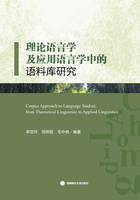
References
ÄDEL A,2006. Metadiscourse in L1 and L2 English[M]. Amsterdam:John Benjamins Publishing:24.
BAZERMAN C,1984. Modern evolution of the experimental report in physics:Spectroscopic articles in Physical Review,1893-1980[J]. Social studies of science,14(2):163-196.
BIBER D, CONRAD S, LEECH G N,2002. Longman student grammar of spoken and written English[M]. Harlow:Longman.
ÇANDARLI D, BAYYURT Y, MARTI L,2015. Authorial presence in L1 and L2 novice academic writing:Cross-linguistic and cross-cultural perspectives[J]. Journal of English for academic purposes,20:192-202.
FLØTTUM K, FINN T, DAHL T,2006. “We now report on...” versus “Let us now see how...”:Author roles and interaction with readers in research articles[M]//HYLAND K, BONDI M, Eds. Academic discourse across disciplines. Frankfort am Main:Perter Lang.
GEERTZ C,1988. Works and lives:The anthropologist as author[M]. CA:Stanford University Press.
HARWOOD N,2005a. ‘We do not seem to have a theory ... The theory I present here attempts to fill this gap':Inclusive and exclusive pronouns in academic writing[J]. Applied linguistics,26(3):343-375.
HARWOOD N,2005b. ‘Nowhere has anyone attempted ... In this article I aim to do just that':A corpus-based study of self-promotional I and we in academic writing across four disciplines[J]. Journal of pragmatics,37(8):1207-1231.
HARWOOD N,2005. ‘I hoped to counteract the memory problem, but I made no impact whatsoever':Discussing methods in computing science using I[J]. English for specific purposes,24:243-267.
HARWOOD N,2007. Political scientists on the functions of personal pronouns in their writing:An interview-based study of ‘I'and ‘we'[J]. Text & talk,27(1):27-54.
HYLAND K,2001. Humble servants of the discipline? Self-mention in research articles [J]. English for specific purposes,20(3):207-226.
HYLAND K,2002. Authority and invisibility:Authorial identity in academic writing[J]. Journal of pragmatics,34(8):1091-1112.
HYLAND K,2003. Dissertation acknowledgements:The anatomy of a Cinderella genre[J]. Written communication,20:242-268.
HYLAND K,2004. Genre and second language writing[M]. MI:University of Michigan Press.
HYLAND K,2005. Metadiscourse[M]. London:Continuum.
HYLAND K,2015. Metadiscourse[M]//TRACY K, Eds. The International Encyclopedia of Language and Social Interaction. NJ:Wiley-Blackwell:1-11.
HYLAND K, JIANG F,2017. ‘We Believe That...':Changes in an academic stance marker[J]. Australian journal of linguistics,38(2):139-161.
IVANIČ R,1998. Writing and identity[M]. Amsterdam:John Benjamins Publishing Company.
IVANIČ R, CAMPS D,2001. I am how I sound:Voice as self-representation in L2 writing [J]. Journal of second language writing,10(1-2):3-33.
JOHN S P,2005. The writing process and writer identity:Investigating the influence of revision on linguistic&textual features of writer identity in dissertations[D]. Birmingham:University of Birmingham.
KUO CH,1999. The use of personal pronouns:Role relationships in scientific journal articles[J]. English for specific purposes,18(2):121-138.
LEECH G,1983. Principles of pragmatics[M]. London and New York:Longman.
MARTÍNEZ I A,2005. Native and non-native writers' use of first-person pronouns in the different sections of biology research articles in English[J]. Journal of second language writing, 14(3):174-190.
QUIRK R, GREENBAUM S, LEECH G, et al.,1985. A Comprehensive Grammar of the English Language[M]. London:Longman.
RAMANATHAN V, ATKINSON D,1999. Individualism, academic writing, and ESL writers[J]. Journal of second language writing,8(1):45-75.
SWALES J,1990. Genre analysis:English in academic and research settings[M]. Cambridge:Cambridge University Press.
TANG R, JOHN S,1999. The‘I'in identity:Exploring writer identity in student academic writing through the first-person pronoun[J]. English for specific purposes,18:S23-S39.
ZOU YL,2018. First person pronouns in academic discourse by novice writers in China [D]. Birmingham:University of Birmingham.